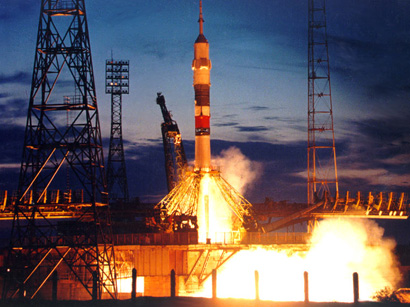Azerbaijan, Baku, Sep. 24 / Trend E. Kosolapova/
The Russian Space Agency through the Foreign Ministry has officially informed the Kazakh government on the date of next Proton launch from the Baikonur Cosmodrome, Russian newspaper Izvestia reported on Tuesday.
"The Proton carrying Astra 2E communications satellite will be launched on September 30, in compliance with the bilateral agreement on the Baikonur cosmodrome leasing," a source in Russian Space Agency told Izvestia.
According to the source, Russia will not wait until Kazakh authorities and Environment Ministry in particular permit to resume Proton launches. Earlier this Ministry insisted in postponing the launches from Sep. 15 until complete detoxification after Proton crash in July.
"The detoxification at the Baikonur has been completed. Our Kazakh partners are aware of this, but do not allow us to resume the launches. In our opinion, the reason is that they are just trying to put pressure on us," the source said.
The Proton-M carrier rocket with three Glonass-M Russian navigation satellites fell on July 2 at the Baikonur Cosmodrome one minute after the start. The Emergency Commission investigating the incident concluded that the incident was provoked by incorrectly installed angular rate sensors.
The Baikonur Cosmodrome is the world's first and largest operational space launch facility. It is located in the desert steppe of Kazakhstan. It is being leased by the Kazakh government to Russia (until 2050) and is managed jointly by the Russian Federal Space Agency and the Russian Space Forces. Under the current Russian space program, Baikonur remains a busy space port, with numerous commercial, military and scientific missions being launched annually.






